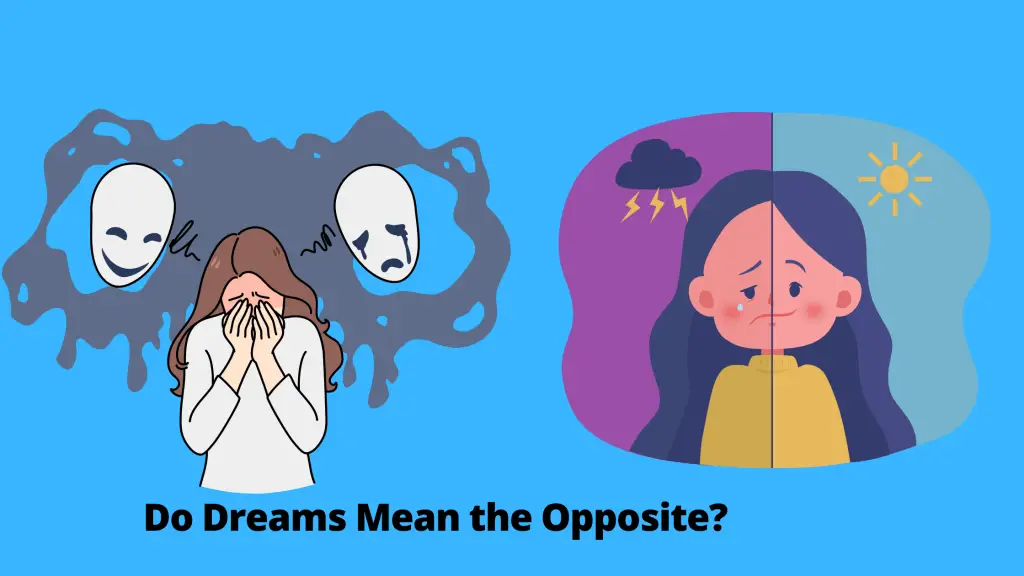
Many people believe that dreams are a reflection of our unconscious desires and that they can provide insight into our waking life.
However, some experts believe that dreams actually mean the opposite of what we think they do.
According to this theory, the dream world is a mirror image of our waking lives, and the things we see in our dreams are actually our deepest fears and worries.
This would explain why certain things in our dreams often seem to be the opposite of what we want or hope for in real life.
Whether or not this theory is true, it’s clear that dreams continue to be a source of intrigue and fascination.
Do Dreams Really Mean the opposite?
The truth is that dreams do not always mean the opposite. Dreams are often a reflection of our unconscious desires. Those desires come from a variety of places, such as our values, experiences, and beliefs.
Sometimes, the things we see in our dreams do symbolize the opposite of what we want or hope for. But this is not always the case. There are other dream symbols that can have positive or negative connotations, depending on the context.
In the past
People often believed that if you are having a good dream, then something bad is going to happen and vice versa.
Especially when elderly people always would interpret dreams as the opposite of things that will happen in reality.
Nowadays
Now, experts have debunked this claim and stated that dreams do not mean the opposite. There are many facts that affect what a person dreams about.
It could be based on their mental state, what they ate before bed, or even if they are taking medication. The meaning of each dream is unique to the person experiencing it.
Dreams are often just a collection of random images and thoughts that your brain has processed during the day.
What is the opposite of dreaming?
According to dream theory, when we dream, we are able to let go of the conscious restrictions of the waking world and explore our deepest desires and fears.
This can be a helpful way to process difficult emotions or trauma. However, some people find that their dreams are so vivid and real that they have a hard time distinguishing between the dream world and reality.
For these people, dreaming can be a nightmare. The opposite of dreaming would be to be fully present in the waking world and completely aware of everything around you.
In other words, it would be impossible to get lost in your own thoughts or daydreams. While this may sound ideal, it could also be quite daunting.
Our dreams give us a chance to escape from reality and explore our innermost selves. The dream world may be different from the waking world, but it can still teach us a lot about who we are.
What Does it Mean If Dreams are Opposite of reality?
If dreams are the opposite of reality, it could mean that they are a way for our brains to process difficult emotions or trauma. Dreams can be a helpful way to process difficult emotions or trauma.
If you dream of the opposite sex, it could symbolize your fear of the opposite sex. If you dream about an object, it could symbolize your fear of that object.
To dream about the opposite of reality could also be a way for your brain to process new information.
For example, if you are learning a new skill, you might dream about the opposite of what you are doing in order to better understand the concept.
Or if you are experiencing a major life change, such as a move or a new job, you might dream about the opposite of what is happening in order to help you adjust to the change.
In general, dreams about the opposite of reality might mainly represent:
- anxiety
- wish fulfillment
- regret
- processing something new
- a sign that you need to change something in your life
What Does it Mean if Dreams are not the opposite of reality?
If dreams are not the opposite of reality might suggest that our brains use dreams to process events and experiences that we can’t handle in waking life.
For example, if you have a dream about a plane crash, it may be your brain’s way of processing your fear of flying.
However, this theory doesn’t explain why some people have dreams that seem to have no connection to their waking life.
It also doesn’t explain common dreams, like falling or being chased. As such, it’s likely that the true meaning of dreams is much more complex than we realize.
Do nightmares foretell the future?
No, nightmares do not foretell the future.
While it’s true that some people have dreams that seem to come true, there is no scientific evidence to suggest that this is more than just coincidence.
If you have a nightmare about something bad happening, it doesn’t mean that it will necessarily happen.
However, nightmares can be a sign that something is bothering you on a subconscious level.
How are dreams related to reality?
Dream researchers have found that dreams are related to reality in a number of ways. For example, when you dream of an event that has happened in your life, it is often based on reality.
Even if the event didn’t happen exactly as you dreamt it, there is usually some connection to reality. Dreams can also be based on your current reality.
For example, if you dream of being chased by a bear, it might be because you are worried about something in your life that feels threatening.
Dreams can also be symbolic of reality. For example, if you dream of winning the lottery, it might represent something good that is happening in your life.
But, dreams can also be completely unrelated to reality. This is often the case with nightmares.
However, even in these cases, there is usually some connection to something that is going on in your life. Only you can determine what that connection is.
How are dreams related to your spiritual world?
One theory is that they provide a “royal road” to the unconscious mind, allowing a person to access feelings and memories that might otherwise be hidden.
The dreams that are related to your spiritual world could be ritually or symbolically significant.
For example, if you dream of loved ones who have died, it could be your way of connecting with them on a spiritual level.
Or, if you dream of a religious figure, it could be a sign that you are searching for guidance from a higher power.
But dreams could always represent your spiritual world in a more personal way that is unique to you.
The Truth about dreams
One theory is that dreams are a way for your subconscious to communicate with you. However, there is no evidence to support this theory.
Another theory is that dreams are a way for your brain to process information from the day. This theory is supported by research that has shown that people often dream about things that happened during the day.
Dreams also tend to be more vivid when you are tired, which suggests that they are simply a way for your brain to take a break from reality.
How to handle the opposite dreams?
If you have a dream that seems to be the opposite of reality, it’s important to take some time to figure out what it might mean.
Here are a few things you could do:
1. Try to remember as much as you can about the dream. What were you doing? Who was there? What happened?
2. Think about what might be going on in your life that could be causing you to have this dream. Are you worried about something?
3. Talk to someone you trust about the dream and see if they have any insights.
4. Write down the dream and do some research to see if there are any common interpretations of dreams like yours.
Interested facts about the Dreams are Opposite of reality
60% of Americans believe that dreams have the ability to tell the future.
30% of Americans believe that dreams are reflective of a person’s true feelings.
Only 10% of people believe that dreams are meaningless.
Dreams can be based on reality, but they can also be symbolic or completely unrelated to reality.
Dreams sometimes could mean the opposite of reality only if they are interpreted in the right way.
People who had the opposite of reality dreams usually feel more tired than people who don’t have those dreams.
Understanding the Opposite of reality dreams
The opposite of reality dreams could be a way for your subconscious to communicate with you. They could also be based on your current reality or be symbolic of reality.
If you have an opposite of reality dream, try to remember as much as you can about it and think about what might be going on in your life that could be causing you to have this dream.
An opposite of reality dream could have many means, but it could mainly mean:
- inner conflict
- worry
- escape
- the need for change
- something you are repressing
- a way for your brain to take a break from reality
Conclusion
Dreams are a complex topic, and there is still much we don’t understand about them. If you have the opposite of a reality dream, try to figure out what it might mean by thinking about what is going on in your real life and looking up the common dream interpretations.
Most importantly, don’t forget that dreams are often symbolic and not always literal. So, take everything with a grain of salt and try not to worry too much about what your dream means.








2 thoughts on “Do Dreams Mean the Opposite? The Truth About Dreams”
This is amazing now i have a full and concise knowledge about dreams
I’m glad to hear that you found the information helpful! If you have any further questions or need more information, feel free to ask.